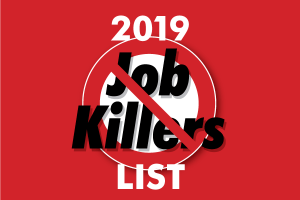 A California Chamber of Commerce job killer bill that will increase costs and impose onerous burdens on garment industry employers will be considered by the Senate Appropriations Committee on Tuesday, June 9.
A California Chamber of Commerce job killer bill that will increase costs and impose onerous burdens on garment industry employers will be considered by the Senate Appropriations Committee on Tuesday, June 9.
SB 1399 (Durazo; D-Los Angeles) imposes unfair and onerous burdens on any essential business in the apparel industry, makes significant changes to evidentiary standards for liability, and creates an unfair playing field between union and nonunionized employers. Like all employers, businesses in this industry have suffered from the financial crisis of this pandemic. SB 1399 only worsens that suffering.
Collective Bargaining Agreement Exemption
This bill imposes significant burdens and liability onto any employer or contractor in the garment manufacturing industry, including a new category of companies defined as “brand guarantors,” which basically includes any person or entity in the clothing industry, including dry cleaners, small and large retailers, secondhand retailers, personal shoppers, online personal shoppers, and more. But interestingly, SB 1399 provides a blanket exemption to nearly all these laws if employees are covered by a “bona fide collective bargaining agreement.” If these proposed changes are appropriate for nonunionized workforces, then they should be appropriate for unionized workforces too, the CalChamber argues.
The CalChamber, which has both unionized and nonunionized employer members, points out that employees who want to unionize and vote to do so, have that right and opportunity. However, proposed laws like SB 1399 that force higher and unreasonable standards onto nonunionized employers while eliminating those requirements for unionized workforces, creates unfair leverage and punishes employees and employers who do not choose/vote to unionize.
Such inconsistent standards also are potentially preempted by the National Labor Relations Act, due to the interference it causes in the labor/management negotiating process.
Elimination of Piece-Rate Compensation
SB 1399 proposes to eliminate piece-rate compensation for any employee engaged in the performance of garment manufacturing. Eliminating this form of payment is unnecessary, the CalChamber points out, given that California law already ensures that all time is compensated at no less than minimum wage. Even when a worker is not performing “productive work” for purposes of earning piece-rate compensation, the employee still is entitled to no less than minimum wage.
Piece-rate compensation can be beneficial for employees, as it provides an opportunity to earn a higher income. This issue was debated in 2016 in AB 1513 (Williams; D-Carpinteria) after the decision in Gonzalez v. Downtown LA Motors was issued. Given the benefits to employees, the Legislature allowed this form of compensation to continue, clarifying the payment for nonproductive time.
This section of the bill provides a collective bargaining exemption, meaning it does not apply to unionized workers. Employees who do not choose to be unionized should not be punished by eliminating the opportunity to earn income through a piece-rate model that can provide higher wages.
Imposes Liability for Labor Violations
Current law already provides liability for wage and hour claims when a third party exerts control over the working conditions of the contractor’s employees. That liability has been confirmed in a number of court decisions.
SB 1399 imposes joint and several liability on any company that contracts with another person for the performance of garment manufacturing or who contracts with a “brand guarantor” as defined, for the minimum wages, overtime, break premiums, liquidated damages, penalties, attorney fees, and workers’ compensation coverage. Basically, any person or entity that contracts in the apparel industry could be on the hook and liable for the wage and hour violations, penalties, attorney fees, etc., even though that person or entity exercised no control over the workers.
AB 5 (Gonzalez; D-San Diego) has already had a chilling effect on contracting in the California economy. SB 1399 will eliminate contracting in the apparel industry in California, as no company will take on the potential liability of having to pay for wage and hour violations it did not commit or paying the attorney fees for another company’s litigation.
Limits a Company’s Right to Due Process
SB 1399 further creates an unfair playing field in this industry by changing the evidentiary standards for a wage claim. SB 1399 creates a “presumption” that a claim for wages is valid against a company if the employee provides the Labor Commissioner with a label “or equivalent thereto” of a brand.
Additionally, SB 1399 eliminates a company’s opportunity to defend itself by stating that witness declarations are insufficient to overcome a presumption, and that any evidence presented by a company must be “compelling and reliable written evidence,” accurate and contemporaneous.
The Labor Commissioner already has authority to make evidentiary determinations, including whether evidence is reliable, compelling, or if a witness is credible. These higher standards simply eliminate a company’s right to due process by drastically reducing the evidence it can submit to avoid being held liable.
Expands PAGA Litigation
By amending the Labor Code, SB 1399 also significantly expands the representative actions that can be pursued through the Private Attorneys General Act (PAGA). PAGA has plagued the employer community for years, with trial attorneys utilizing the law to leverage costly settlements for claims that lack merit. SB 1399 imposes numerous new requirements that will expand the threat of PAGA litigation on employers at a time when they can least afford it.
Broad Documentation Retention Requirement
SB 1399 also imposes a broad document retention policy that does not clearly identify the documents an employer must retain. Specifically, the bill requires an employer to keep “any other documentation pursuant to which work was, or is being, performed.” Given the significant threat of enforcement SB 1399 carries, employers should be provided with a clear, objective list of documents they are required to retain then SB 1399 provides.
Staff Contact: Jennifer Barrera


